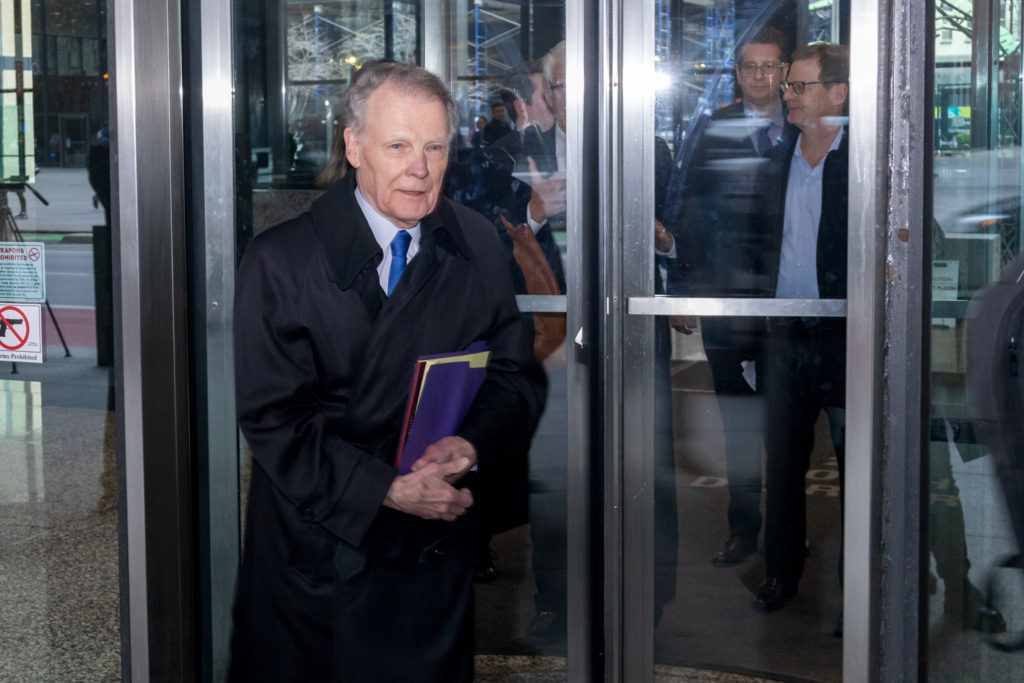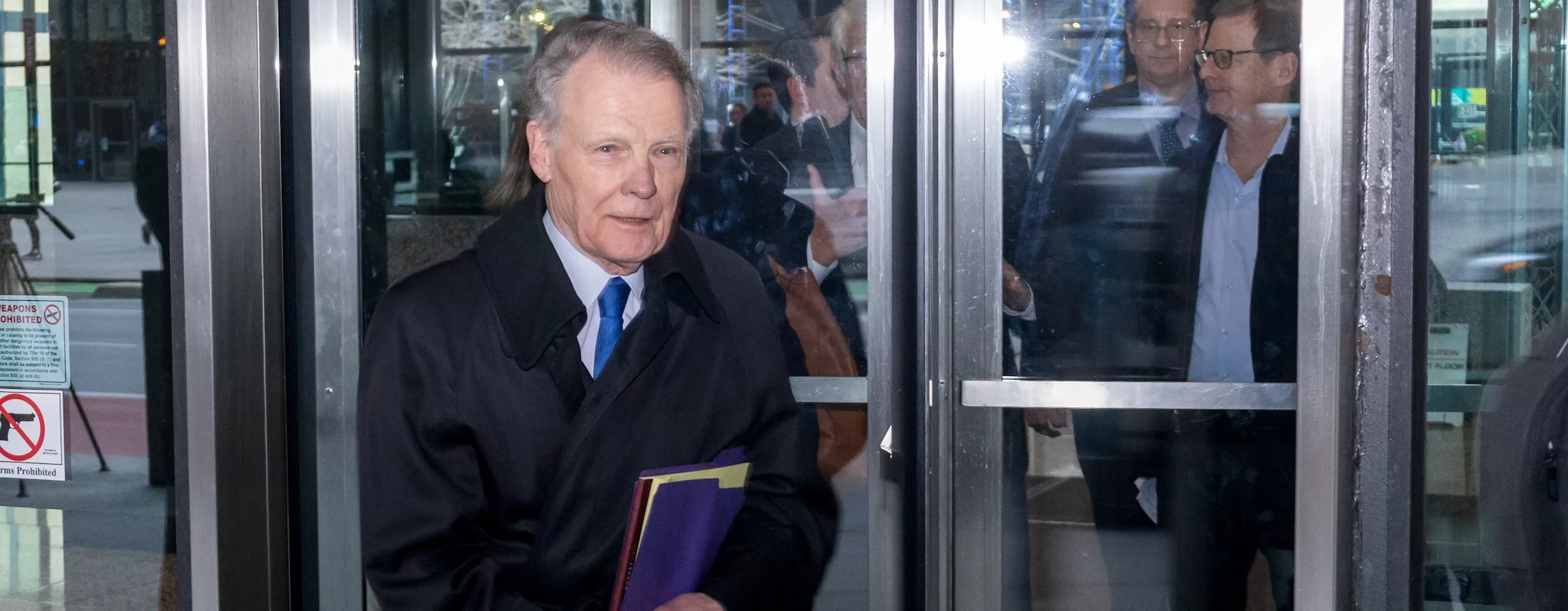
By HANNAH MEISEL
Capitol News Illinois
hmeisel@capitolnewsillinois.com
CHICAGO – In 2006, electric utility Commonwealth Edison was riding out the last year of a decadelong state-mandated rate freeze, which had put the company in “dire” financial straits.
In a period when corporate profits climbed at record rates, ComEd was an outlier. And as the utility stared down the possibility of state lawmakers extending that rate freeze beyond the 10-year period, ComEd officials were preparing paperwork to declare bankruptcy.
Within a handful of years, however, the utility went from being on the brink of financial ruin to investing $2.6 billion in massive infrastructure upgrades, all made possible by a few key pieces of legislation in Springfield.
Federal prosecutors allege ComEd’s 180-degree turnaround was the result of a yearslong bribery scheme benefitting longtime Illinois House Speaker Michael Madigan. And after a jury convicted four former ComEd lobbyists and executives last year for their roles in the scheme, Madigan is now sitting for his own trial in a case that extends to alleged corruption far beyond his dealings with the utility.
In a federal courtroom on Wednesday, Madigan took occasional notes while listening to hours of testimony from Scott Vogt, ComEd’s vice president of strategy, energy policy and revenue initiatives. As a witness for the government, Vogt explained how the utility began “scratching and clawing” its way to financial solvency after a decade under the rate freeze.
While ComEd caught a break when lawmakers ended up not extending the decadelong rate freeze into 2007, that didn’t mean the utility could suddenly increase what it was charging customers. ComEd went before the Illinois Commerce Commission, the state entity that regulates utilities, three times in the next five years to request rate increases. But each of the 11-month processes yielded a rate increase far short of the $318 million hike the utility requested.
ComEd’s 2007 rate case, for example, ended with the ICC only approving an $8 million increase in electric rates – less than 3 percent of what the utility said it needed. Vogt said ComEd’s dividends for shareholders were “reduced down to zero.”
“First time in company’s history that we didn’t pay a dividend, and our history goes back to before 1900,” he said from the witness stand.
ComEd had also suffered credit rating downgrades, which increased the cost of borrowing for the company.
The utility’s next attempt yielded $74 million in rate increases, still far short of the figure ComEd believed was necessary for years of deferred maintenance in power lines, poles and other infrastructure.
The 2008 global financial crisis didn’t make things any better, Vogt said, as “bad debt spiked” when homeowners were abandoning houses they couldn’t afford – also abandoning their ComEd bills – in addition to the run-of-the-mill cases where customers didn’t pay their electric bills.
But the utility scored a legislative win in 2009 when the General Assembly approved legislation ComEd pushed to spread the cost of those debts to the rest of its customer base.
In 2011, though, the utility’s fortunes really turned with the passage of the Energy Infrastructure Modernization Act – the first law central to the government’s theory of ComEd’s alleged bribery scheme. Prosecutors say the utility gave jobs and contracts to Madigan’s political allies in exchange for favorable legislation in Springfield.
Just as they did in last year’s “ComEd Four” trial, defense attorneys are likely to lean heavily on the fact that the 2011 law, also known as “Smart Grid,” had already been heavily negotiated by Madigan’s office during the General Assembly’s spring legislative session that year. It initially passed in May 2011, three months before ComEd inked the first no-work contract with former Chicago Ald. Frank Olivo, a Madigan ally who for years represented the speaker’s Southwest Side power base in the 13th Ward.
But then-Gov. Pat Quinn vetoed the legislation, necessitating a veto override vote during lawmakers’ fall session that year.
Included in Smart Grid was an overhaul of the way consumer electric rates were calculated. The new process, known as formula ratemaking, created a new tool for ComEd to recoup what it said was the true cost of running and improving electric service for its customers in northern Illinois.
Formula ratemaking, unlike traditional ratemaking, provided for more stable revenues for the utility, Vogt said, and allowed ComEd to massively upgrade its infrastructure and save customers money. Watchdog groups dispute the utility’s claim and say the cost of energy has come down across the board in the last decade, which in turn lowered prices for customers.
ComEd went back to Springfield in 2013, asking for tweaks to the Smart Grid law after the ICC still wasn’t approving the utility’s rate increases in the way it believed regulators should under the new law. After that, ComEd was able to eventually invest $2.6 billion in infrastructure – half to traditional wires, poles and substations with the other half going toward major technology upgrades, including “Smart Meters.”
Vogt said the infrastructure improvements allowed ComEd to vastly improve reliability and resiliency for customers, meaning fewer power outages and faster recovery from outages.
In 2016, ComEd and its parent company Exelon got another massive piece of legislation through the General Assembly. The Future Energy Jobs Act, which included big ratepayer subsidies to bail out two of Exelon’s nuclear power plants, also included measures that would incorporate things that customers wanted — namely energy efficiency and renewable energy — into ComEd’s business model.
“We were trying to take a threat for the company and turn it into an opportunity,” Vogt explained.
But just like Smart Grid, passing FEJA was no easy task. Negotiations, which were led by attorneys in Madigan’s office and included a wide range of stakeholders from organized labor to environmental groups, stretched from early 2015 down to the wire on the last day of lawmakers’ fall veto session in December 2016. Under cross-examination by Madigan attorney Dan Collins, Vogt said he remembered very clearly that there were seven amendments put on the bill in the hours before it passed.
“It was two years of my life I won’t soon forget,” Vogt said.
ComEd dispatched its entire roster of 40 contract lobbyists to make sure no legislators were leaving Springfield before the vote. “Guarding elevators was a job task” on that day, Vogt quipped.
But prosecutors sought to underscore that none of those contract lobbyists doing the last-minute wrangling to get FEJA across the finish line included the Madigan allies ComEd took on as subcontractors — a number that had grown since Olivo was cut his first checks in 2011.
“Did you ever see this person in Springfield working as a ComEd lobbyist or consultant?” Assistant U.S. Attorney Julia Schwartz asked Vogt, showing him a photo of Olivo.
“No,” Vogt said.
Schwartz repeated the exercise with photos of other Madigan allies, asking if Vogt even recognized them.
“No,” Vogt said each time.
Capitol News Illinois is a nonprofit, nonpartisan news service that distributes state government coverage to hundreds of news outlets statewide. It is funded primarily by the Illinois Press Foundation and the Robert R. McCormick Foundation.




